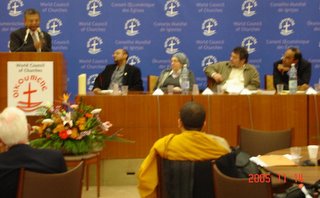This week I received letters of Advent Greeting from two friends in Bethlehem. One from Rev. Dr. Mitri Raheb, pastor of Christmas Lutheran Church in Bethlehem and author of Bethlehem Beseiged and the other from Elias Issa Halabi, a student at Bethlehem University, both of whom we met during our Jewish Christian Mission of Peace to Israel/Palestine. But before we get to those, here's a picture of the entrance to Bethlehem. It is disheartening to see the birth place of the Prince of Peace surrounded by a 30 foot tall concrete wall. On the other side of this wall is a military check point.

Entrance to Bethlehem.
This picture was taken during the Jewish Christian trip to Israel/Palestine Sept. 2005
From Rev. Dr. Mitri Raheb
Dear friends,
As the eyes of the world focus once again on Bethlehem as the Advent season begins, we encourage our brothers and sisters worldwide, as they meditate on Christ's birth here 2000 years ago, to be mindful of what is going on in Bethlehem today.
The psalm for the first Sunday in Advent is Psalm 24, which proclaims, "Gates, lift up your heads; open wide, eternal doors, here is the King of Glory!"
The mention of gates and eternal doors strikes us in Bethlehem as a chilling reminder of the events of the past few weeks. As the psalmist calls us to open wide the gates and doors to welcome Christ, our King, the Israeli Government has shut the gates and doors to our town and opened what they call a "terminal." This terminal is an early Christmas present to Bethlehem that seeks to keep locals in and foreigners out, with the inconvenience of waiting for entire busloads of visitors to be processed one-by-one and the intimidation from armed soldiers patrolling the queues from an elevated walkway.
Yet despite this latest insult to human rights and peaceful coexistence, over 120 friends and professionals from 23 countries came to Bethlehem in the beginning of November to build bridges and discuss together how two peoples with multiple identities can share this one land.
If you cannot come to Bethlehem this season, we invite you to visit our website to read these stories and more, so you may get a sense of the hopes and fears which suffuse life in Bethlehem today.
Many thanks for your ongoing prayers and support. We are praying for you, too.
Sincerely,
The ICB Staff
Rev. Dr. Mitri Raheb
General Director: The International Center of Bethlehem & Dar al-Kalima Academy
Senior Pastor: Evang. Lutheran Christmas Church
Paul VI. Str. 109
Bethlehem
Tel. +972 2 277 0047
Fax. +972 2 277 0048
http://www.annadwa.org/
http://www.bethlehemmedia.net/
Read also Mitri's letter to Senator Hillary Rodham Clinton http://www.annadwa.org/articles/senclinton.htm
From Elias Issa Halabi
Greeting from the land of our lord Jesus Christ
Well, this is Elias Issa Halabi one of the student ambassadors from Bethlehem university. I just want to take this chance again to thank you for coming to Palestine and specially Bethlehem , this visit encouraged us and encouraged me in a way that I wanted to thank each of you individually .
One visitor asked me once: “how can I help you and help the Palestinian people “.and my simple answer was that for you coming here to Palestine and seeing what we are facing in a daily bases, check points .the separation wall, unemployment, daily suffering and mistreated by the occupation and then going back telling what you have seen, that’s the best thing you can help me and my people with. And of course that includes praying for the peace in our land, peace for Israel and the Palestinians.
Reconciliation is what both nations needs, and without reconciliation and without the dialogue we cant live together, and you already took part of that, and as I mentioned I am part of a reconciliation group which is trying to bring people together and talk about peace ….so please pray that I will continue having this courage because with all we see its hard to love the enemy as our lord asks us to do. But here comes the miracle that is needed ….
So, I just want to thank you again, and I hope we will keep in contact and will share some experiences together ….
God Bless You
Your sincerely:
Elias Issa Halabi



